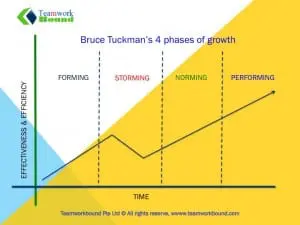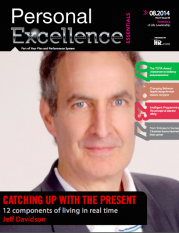Every individual in an organization contributes his expertise for the collective purpose of seeing the department goals are met. Teams just like the fabrics of society and family, are an intricate eco systems of individuals, behaviours, and unique nuances, dictated by organisational culture, office politics and bosses.
The very best and brightest will not automatically bring about organisational results. Individuals in a team need to learn how to work with one another, grow together and achieve outstanding performance centred on their common purpose. What is a definition of a Team? It’s the make up as a whole, a group of people with various skill sets, experience, competencies and jointly responsible for achieving a collective goal. Tuckman’s model, introduced the 4 phases of Team growth.
Forming stage – The start of a the team formation stage where, excitement is high, members are politically correct and polite, and usually at least most of the time, performance is low
Storming stage – Conflicts, may arise, uncooperative behavior manifests itself, and individuals collide due to differences
Norming phase – Relationships becomes clearer, and work is done in a productive and clearer manner
Performing phase – There is a high level of trust, optimal cooperation, with team effectiveness leading to results

Tuckman Model for Team building
I have introduced the Tuckman’s model as a overview for you to assimilate the GRPI model for team development. The 2 phases seen in Forming and Storming can be shortened using this model. My own experience of having worked in Teams and facilitating team development, this model will help you steer and develop teams centred on a common purpose or goals. GRPI, first introduced by Richard Beckhard (1972) describes the different dimension of defining a team arranged in a linear priority driving towards performance.
GOALS
ROLES
PROCESSES
INTERACTIONS
As a young flight dispatcher, working in flight operations, I remembered being overwhelmed, by the simple fact that I was working for the world’s no. 1 airline then. Reputation alone will not account for productive teams. In retrospect, we were perhaps the most disorganised lot. We were not made aware of the departmental KPI’s. There were conflicts between the young Dispatchers, and the older Dispatchers, it was so bad, Dispatchers did not even talk to the manager in charge. Between, the manager and the Team, there was a huge disconnect. Amongst the Dispatchers, there were also groups that formed, and being part of such groups would help you through tough shifts. Having spent 4 years here, the glittering sight of the amazing Boeing 747 did not truncate into a well polished team. Everyone fended for himself, and politically it was as good as being in the sewer if you choose to side any group. Clear common purpose when fuzzed up with, an incompetent Leader and the day to day fire fights, is a recipe for disaster. It was not the best place to work.
Using the above GRPI framework, Pritchett, Tichy, & Cohen 1998: Tichy, 2002, observed that 80% of conflicts in teams are attributed to unclear goals. From the remaining 20%, 80% is atributed to unclear roles. From the remainder, 80% attributed to unclear processes and finally only 1 % of the conflicts in teams is attributed to interpersonal relationships.
Frame your goals right and you will be able to take your Team forward in leaps and bounds. Create a compelling purpose that will not only provide opportunities to develop teams, they also develop the individuals. We have our nuances, personal pride, team accountability and leaders they have respect for, are huge motivational triggers to get teams to perform. Our training programs are centred on achieivng these outcomes. Do get in touch with us to find out more, on how we incorporate the GRPI framework in our training programs.
To find out more about our programs
click here
About the Author: Ebnu Etheris Ma.IDT, B.Hrd
Related Posts
- Categories: People analytics, Belbin Team Roles
Unlock the secrets to successful teamwork at the work place using Belbin Team roles. What are the secrets that enhances team performance at the work place is shared in this article. The 7 secrets towards enabling high performance and our approach in conducting Belbin Singapore programs are shared.
- Categories: Experiential learning, Growth and culture, Work plan retreats
Having spent more than 10 years driving organisation and corporate performance, we share with you the use of Experiential learning programs that we have conducted for MNC's such as Panasonic and government agencies.
Top 10 activities
This blog will showcase top 10 experiential activities that we have conducted in our training programs. Included are models associated with experiential learning, team dynamics, understanding personality and leadership. We will showcase crisp summary of good books we have read on this blog as well.
Ebnu Etheris
MA.IDT and B. Ed & Trn
Founder Teamworkbound
Magazine Feature

Personal Excellence Magazine (Aug 2014 issue) based in Canada featured our article.

Human Resources Magazine (July 2012 issue), featured Teamwork Bound views on what it takes to engage senior managers.
Our Evaluations
Blog articles
Get started with Teamwork Bound
Want to learn what Teamwork Bound can do for you? See for yourself with a free trial, tests and short in house speaking engagements. We will assure you that our program evaluations meet 85% percentile score, failing which we will not charge for our training sessions.
